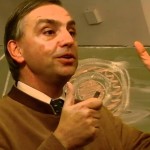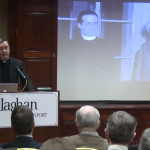Science and Faith: Two Paths of Knowledge
by Dr. Christopher Baglow
Filed under Science
Catholics acknowledge many paths which the human mind can traverse. One of those paths, the one that leads to knowledge of the natural universe, is called natural science, and another, the one that leads to knowledge of God and spiritual realities, is called faith. Both paths can be described as “thinking with assent.” That is, both are the use of reason by which one reaches a conclusion about reality—“thinking.” And both of them involve an assent to truth, an insight about what is discovered, a response of “yes, this is true.”
Beyond the fact that they can be defined in the same way they are truly very different paths. What makes them different from each other is the order in which thinking and assent occur. In natural science, thinking occurs first and makes assent possible and even necessary. But in faith, assent and thinking walk hand in hand; they occur simultaneously and balance each other. St. Augustine points to the difference when he says “Everyone who believes, also thinks; thinks in believing and believes in thinking.” (PL 44:962-963)
Why the difference between them? The key can be understood if we recall one essential element of spirit: the element of freedom. In natural science, reality is explored through the use of strict demonstration, involving experimentation and repeatability. Once a scientific possibility is convincingly shown to be the case, however, the honest person must assent to it. The will is forced by the obviousness of what is demonstrated by science; we are not free to refuse it and remain honest with ourselves.
But in knowing a spiritual reality we are always dealing with another free, intelligent person. Here one may search and strive and get a little knowledge, but only if the other person “opens up” a way for us, and only if we assent freely to his/her invitation, is true and profound knowledge of that person possible. In this kind of knowing, the will is not forced. It is invited by another will; and if my will responds to that invitation, then I can advance in knowledge. This is exactly how love between two persons “works”—one can be drawn to another by beauty or by what one perceives of the person through his or her words and actions. But only if the two wills are mutually open can knowledge progress to a deep intimacy.
So natural science reveals knowledge of things that do not have freedom in how they are known and does so in a way in which the evidence compels us to assent to certain conclusions. But knowing another intelligent, free person—a spiritual reality—involves a constant openness to know and an openness to being known. In the latter, at each and every step, thinking and assent walk hand-in-hand in an act of trust.
Here we see that these two paths of knowledge are not in opposition to each other. They are simply different, as different as analyzing a tissue sample is different from knowing a friend. In the words of Blessed John Paul II, “Truth is one. However, it presents itself to us in a fragmented manner along the many paths that lead us to approach it in a differential way. Thus it is man’s greatness that he dedicates himself unwearyingly to penetrate all the dimensions of truth.”
Do the two paths ever meet? They do—the human person is truly the crossroads of science and faith. Our bodies are physical and subject to the laws of nature, and yet we are also spiritual, intelligent, free persons. Human beings are intrinsically natural and spiritual—in the material universe but not entirely of the material universe. Therefore, to be a human being is to be a knower and a lover of nature and spirit, because to be human is to be both. Another place they meet is in the discipline called philosophy, in which reality is considered in those characteristics that nature and spirit have in common.
Related Posts
Note: Our goal is to cultivate serious and respectful dialogue. While it's OK to disagree—even encouraged!—any snarky, offensive, or off-topic comments will be deleted. Before commenting please read the Commenting Rules and Tips. If you're having trouble commenting, read the Commenting Instructions.












